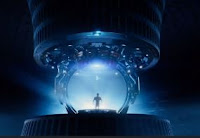How is it possible to change an event after the event happens? At the quantum level, that is what can occur. Time is not linear but somehow jumbled. (Does this have philosophic implications for the study of free will? That is, events can be changed at the micro level.)
If you aren't confused by quantum physics, you really haven't understood it. (Neils Bohr)
In a sense, time machines already exist. In quantum theory, actions in the present could change the past, or at least determine it.
To explain very puzzling quantum phenomena Neils Bohr and Werner Heisenberg provided our world with the 1927 Copenhagen Interpretation of the double slit experiment (see Schrödinger's Cat, 2 January 2004). The Interpretation still stands.
When passed through two slits, a particle behaves strangely indeed. It presents an interference pattern, which can only be accomplished by a wave. The particle has become a wave, and is no longer a particle. To understand how this could possibly happen, physicists sought to record and measure a particle as it passed through a slit. But the very act of observation causes the particle to no longer behave as a wave. This is termed wave function collapse. How can this be? How can it change into one thing, then change again, simply because it is being measured and recorded? Recall Neils Bohr, above.
The interpretation regards as meaningless questions like, Where was the particle before I measured its position? Measurement itself causes wave function collapse.
How is it possible that observation/measurement somehow alters that which is observed/measured? It's cartoonish. Imagine Bugs Bunny firing bullets, which become a spray of water, splitting in order to go through two holes at once to reach the target. Imagine Bugs with a water hose that becomes a pistol again. Some aspects of the world at the quantum level are out of Looney Tunes.
In considering the relationship of observer to experiment, John Archibald Wheeler concluded that choice by an observer may determine experiment outcome. And this, regardless of when the choice is made, even after the "bullet" (particle) is fired. On our "common sense" level this is akin to saying that experimenter choice will determine what a bullet will do after it leaves a gun muzzle.
This is partly how it works:
Fire a photon toward a screen with double slits.
The photon passes through one slit, the other, or both. Presumably whatever the photon does, it does so while passing through the slits.
Past the slits, it heads toward a back wall.
At the back wall, the experimenter has two separate photon detection choices. One is leaving in place a screen while the photon is in transit to the back wall. The other is removing the screen.
After the photon is shooting to the back wall, choice is made to remove the screen or not. This is the delayed choice.
The experiment is much more detailed but the paradox is this. The delayed choice determines whether the particle passes through one slit, the other, or both. The delayed choice of how to measure the particle determines how the particle behaved at an earlier time. A choice in the present seems to have changed the past.
The quantum level experiment has yielded results largely as Wheeler expected them.

